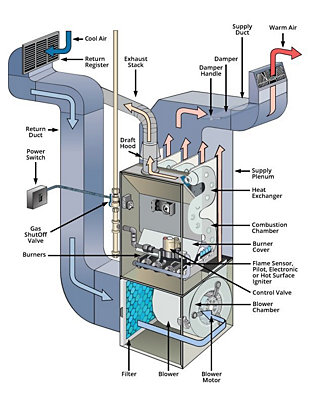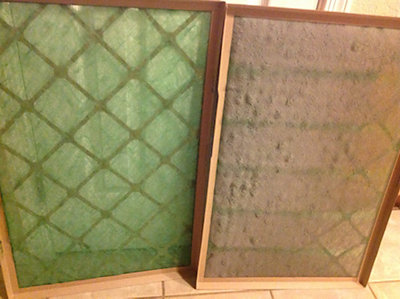
A furnace that starts and stops more frequently than it should is short cycling. Short cycling can cause serious damage to your furnace and higher utility bills.
Common causes of short cycling include:
Let’s cover each of these issues and how you can solve them.
Overheating
Your furnace may be shutting down because the heat exchanger is overheating.
When the heat exchanger overheats, the furnace shuts down to protect it from cracking. When the exchanger cools, the furnace cycles back on.
After overheating several times, it’s only a matter of time before the heat exchanger cracks. You do not want to replace that because it’s super expensive. Basically, if you have to replace the heat exchanger and don’t have a parts warranty for it, you’re better off replacing the entire furnace.
Causes of overheating
Dirty air filter
A clogged filter blocks air over the heat exchanger, meaning that it retains too much heat.
Solution: Check the filter once a month and change it if it looks like this filter on the right.

Shut/blocked off air vents
Shutting supply vents (or allowing them to be blocked by furniture or drapes) can cause the heat exchanger to overheat. You see, when you close vents, you increase pressure in the air ducts, which causes the blower to blow less air because it’s designed to push up against a certain amount of pressure. This low airflow means the heat exchanger exchanges less heat and therefore too much heat builds up.
Solution: Keep your air vents open!
Blocked exhaust vents
Your furnace has to exhaust certain gases out the exhaust vent (called a flue pipe). But if the vent gets blocked by a bird’s nest, leaves or other debris, those hot gases will backup into the furnace and cause it to overheat. Not only that, but dangerous carbon monoxide—an odorless, scentless poisonous gas—can infiltrate your home.
Solution: If you know where your furnace flue pipe exhausts, check and make sure it’s clear. The vent may be on the roof, so be careful!
Thermostat issues
Since a thermostat tells your furnace when to turn off and on, short cycling may be due to an issue with the thermostat, not the furnace.
Two common thermostat issues include:
Malfunctioning
If the thermostat isn’t working properly, it can cause short cycling.
Solution: Have someone repair or replace it.
Improper placement
Placing the thermostat near a heat source (direct sunlight, heat register, kitchen) fools the thermostat’s sensor into thinking that you home is warm enough and turns off the furnace. Then, when the heat source is gone, the thermostat senses that the home isn’t hot enough and turns the furnace back on.
Solution: Ensure that your thermostat is installed on an interior wall away from the previously mentioned heat sources.
Oversized furnace
Did you get a new furnace recently? If so, it may be short cycling because it’s oversized meaning it heats the home too quickly.
“Wait,” you may object. “Isn’t having my home heated quickly a good thing?”
Nope….a furnace that turns on and off too frequently is a huge energy hog, just like turning on and off your car too often wastes gas.
Solution: Contact the HVAC company that installed your furnace and tell them your issue.
If you’re not sure why your furnace is short cycling, contact Coolray for a furnace repair.
Coolray is your Atlanta-area home comfort expert with specialists in heating, air conditioning, air quality and plumbing. Have more questions? We’d be happy to help – just contact us online.
Get up-to-date current news, promotions and industry tips.